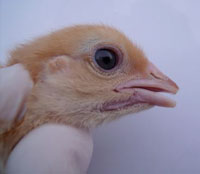CIWF protests at planned delay to beak trimming ban

Animal welfare group Compassion in World Farming is urging DEFRA not to extend the scheduled deadline for banning beak trimming in young poultry beyond 1 January 2011.
In a statement issued this week, CIWF cited two separate studies which, it says, show that both infra-red and hot blade beak trimming can cause acute pain.
A study by Marchant-Forde et al in 2008 had found that chicks that had had their beaks trimmed had lower growth and feed intake, and had exhibited behaviour indicative of acute pain.
Further work had found that infra-red trimming resulted in “the formation and retention into adulthood of traumatic neuromas which have been implicated in causing long-term pain”.
CIWF has therefore called on DEFRA to stick with the beak trimming ban from 1 January 2011.
That seems unlikely, however. Earlier this year, DEFRA ran a consultation setting out its plans to postpone that start-date – though only for infra-red beak trimming.
DEFRA’s view, supported by the Farm Animal Welfare Council, is that any welfare benefits from banning beak trimming would be negated by increased feather pecking and cannibalism as conventional cages are phased out.
“The impact of injurious pecking is greatest in systems of management which do not house hens in cages,” it said. “It is therefore likely to increase after 1 January 2012, when the use of conventional cages will no longer be permitted.”
DEFRA also quoted research by Glasgow University which concluded that “infra-red beak trimming of day old chicks does not result in chronic adverse consequences”.
These views are endorsed by the British Egg Information Council, which has sent a briefing document to MPs, who will have to vote on DEFRA’s plan to postpone the beak trimming ban before the end of the year.
BEIC chief executive Mark Williams said that CIWF was missing the point with its demand for beak trimming to be banned from 1 January 2011. “In our view it would bring no welfare benefit to laying hens – indeed it could have quite the contrary effect,” he said.
The Farm Animal Welfare Council also believes more time is needed, to properly assess the situation under commercial conditions.
But CIWF insists that beak trimming only deals with the symptoms of feather pecking, not the causes. It has produced two case studies – one based on aviary systems in Austria and one on the Waitrose Columbian Blacktail free-range scheme – which show how beak trimming can be avoided if the environment is right.
“The British industry should be learning from these experiences to develop and implement a strategy to end beak trimming without injurious pecking,” said CIWF chief executive, Philip Lymbery.
